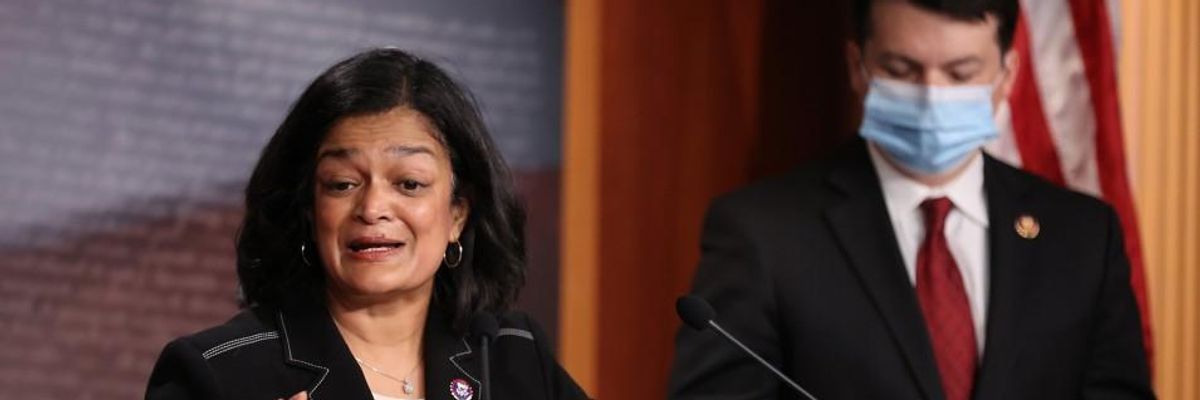As President Joe Biden prepared to continue talks with the Senate GOP's lead infrastructure negotiator on Wednesday, progressive Democrats in Congress implored the White House to stop wasting precious time wrangling with a party that has repeatedly shown it is uninterested in pursuing an adequate legislative package.
"It's time to go big, bold, and fast on an infrastructure plan that repairs bridges and roads--but also guarantees paid leave and child care," Rep. Pramila Jayapal (D-Wash.), chair of the Congressional Progressive Caucus, said late Tuesday. "The GOP isn't going to meet us halfway. It's time to go alone--and get this done."
"Time is tick, tick, ticking past. Every day spent on hopeless bipartisanship is a day not spent on climate."
--Sen. Sheldon Whitehouse
Last week, a group of Republican senators unveiled the outlines of an infrastructure proposal that called for just $257 billion in new spending over eight years--a far cry from the $1.7 trillion in above-baseline spending Biden offered as a compromise proposal. Republicans flatly rejected that offer as excessive, even though the president lopped roughly $500 billion off his initial American Jobs Plan.
Progressive lawmakers, and even some centrists, have grown increasingly frustrated in recent weeks as Biden's talks with the GOP have predictably moved toward less spending as Republican negotiators attempt to strip out key climate proposals and other measures they consider extraneous, including elder care.
"Time is tick, tick, ticking past. Every day spent on hopeless bipartisanship is a day not spent on climate," Sen. Sheldon Whitehouse (D-R.I.) said Tuesday. "We can survive bumpy roads; a ruined planet is for eons."
And yet, as Politico reported Tuesday, "the White House continues to see upside to infrastructure negotiations with Republicans, even as the talks run on longer than President Joe Biden initially planned."
"The president still has faith in his ability to win over reluctant Senate Republicans and advisers see benefits--reputationally and politically--in working across the aisle," according to Politico.
But leading progressives, including Sen. Bernie Sanders (I-Vt.), have warned of the potentially disastrous consequences of dragging out negotiations with Republicans, both for the climate and for Democrats' chances of holding on to their slim congressional majorities.
The Vermont senator and other progressives in Congress have proposed spending $10 trillion over the next decade on rebuilding the United States' core infrastructure, combating the climate crisis by expanding renewable energy, and tackling economic and racial inequities.
"What happens if they spend week after week, month after month 'negotiating' with Republicans who have little intention of addressing the serious crises facing the working families of this country?" Sanders wrote in a CNNop-ed last week. "What happens if, after the passage of the vitally important American Rescue Plan--the Covid-19 rescue package signed into law by President Biden in March--the momentum stops and we accomplish little or nothing?"
Sanders, the chair of the Senate Budget Committee, has said he is prepared to move forward on infrastructure and other priorities using budget reconciliation, a filibuster-proof process that allows lawmakers to pass spending bills with a simple majority.
But Biden and conservative Senate Democrats, most prominently Joe Manchin of West Virginia, have balked at using reconciliation without first attempting to attract Republican support. Manchin, whose vote Senate Democrats need to move forward with their agenda, indicated last week that he would be willing to let infrastructure talks with the GOP continue until the end of the year in the hopes of eventually reaching a bipartisan deal.
As The Hillreported Tuesday, "The White House and congressional Democrats have said they want to get an infrastructure deal passed before the August recess."
"But the more time lawmakers devote to infrastructure," the outlet noted, "the more uncertain it becomes whether Biden can get other priorities passed before the midterms."
With pressing agenda items such as voting rights expansion, immigration reform, and a major safety net boost at risk of dying in the Senate, Rep. Cori Bush (D-Mo.) echoed Jayapal's call for Democrats to move ahead with their policy priorities unilaterally.
"Instead of wasting our energy negotiating against ourselves for an infrastructure package that Republicans clearly have no interest in passing," Bush tweeted, "let's put our energy into abolishing the filibuster, passing the policy we were elected to deliver, and getting ish done for our people."

